Assignment on Diploma in Business 2022
VerifiedAdded on 2022/02/28
|9
|3335
|28
Assignment
AI Summary
Contribute Materials
Your contribution can guide someone’s learning journey. Share your
documents today.
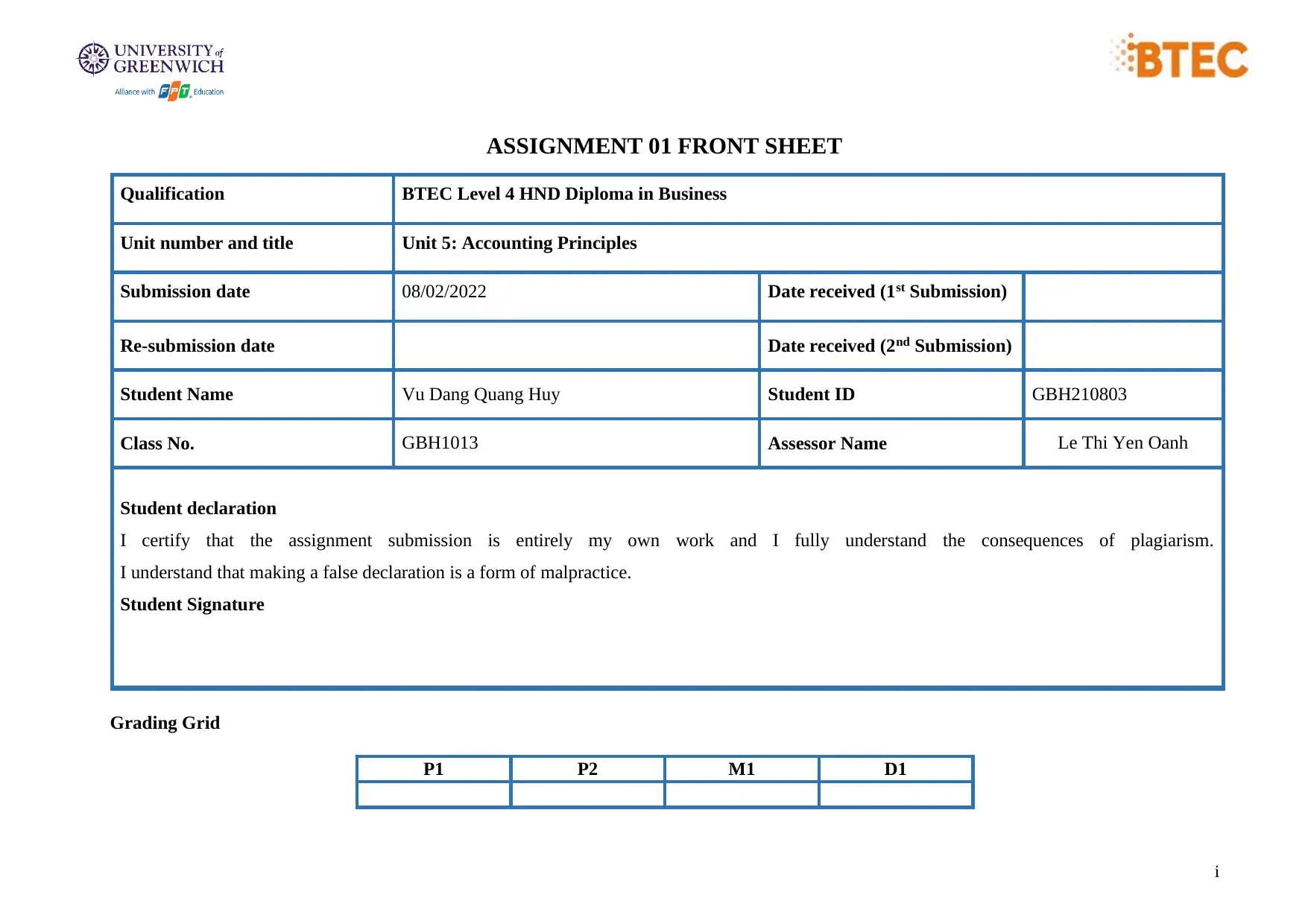
i
ASSIGNMENT 01 FRONT SHEET
Qualification BTEC Level 4 HND Diploma in Business
Unit number and title Unit 5: Accounting Principles
Submission date 08/02/2022 Date received (1st Submission)
Re-submission date Date received (2nd Submission)
Student Name Vu Dang Quang Huy Student ID GBH210803
Class No. GBH1013 Assessor Name Le Thi Yen Oanh
Student declaration
I certify that the assignment submission is entirely my own work and I fully understand the consequences of plagiarism.
I understand that making a false declaration is a form of malpractice.
Student Signature
Grading Grid
P1 P2 M1 D1
ASSIGNMENT 01 FRONT SHEET
Qualification BTEC Level 4 HND Diploma in Business
Unit number and title Unit 5: Accounting Principles
Submission date 08/02/2022 Date received (1st Submission)
Re-submission date Date received (2nd Submission)
Student Name Vu Dang Quang Huy Student ID GBH210803
Class No. GBH1013 Assessor Name Le Thi Yen Oanh
Student declaration
I certify that the assignment submission is entirely my own work and I fully understand the consequences of plagiarism.
I understand that making a false declaration is a form of malpractice.
Student Signature
Grading Grid
P1 P2 M1 D1
Secure Best Marks with AI Grader
Need help grading? Try our AI Grader for instant feedback on your assignments.
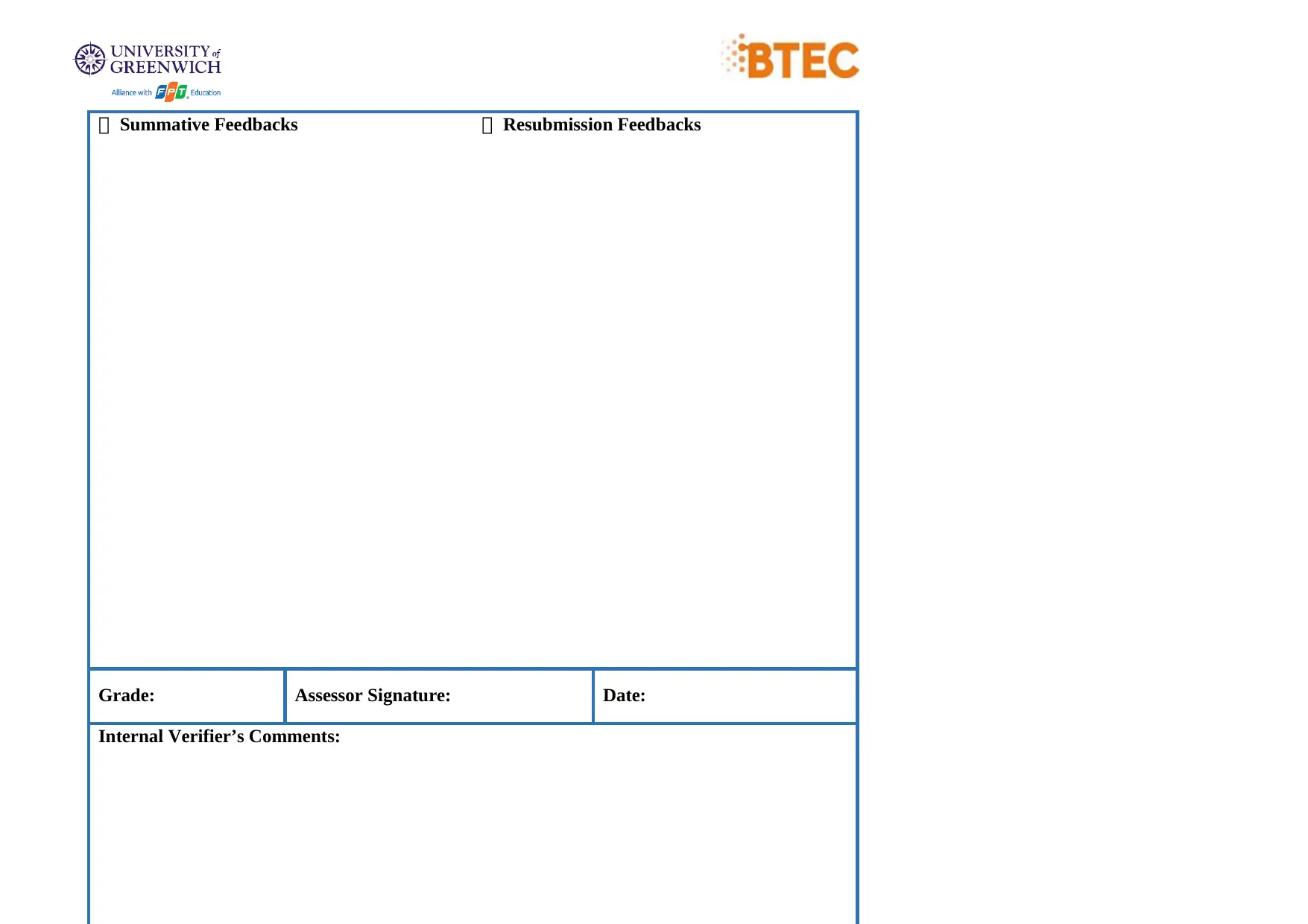
Summative Feedbacks Resubmission Feedbacks
Grade: Assessor Signature: Date:
Internal Verifier’s Comments:
Grade: Assessor Signature: Date:
Internal Verifier’s Comments:

Introduction
As a Graduate Trainee of PricewaterhouseCoopers Vietnam, this report will analyse the role of
accounting in an organisation and evaluate roles and responsibilities of the accounting function.
1. The accounting function in an organisation
Definition: Accounting is the process of recording financial transactions related to a company.
The accounting process that involves summarizing, analyzing, and reporting these transactions to
supervisors, regulators, and tax collectors (INVESTOPEDIA, n.d.).
Purpose of the accounting: According to Indeed Editorial Team (2021), all businesses use
accounting to report, track, execute, and forecast financial transactions. The main duties of
accountants are to store and analyze financial information and monitor monetary transactions.
Accounting is used to prepare financial statements for a company's employees, management, and
investors. Accountants also have the function of ensuring the payment of funds inside and
outside the company. Besides, the purpose of accounting is to gather and report financial
information about a company's performance, financial condition, and cash flows
(ACCOUNTINGTOOLS, 2021).
The main users of accounting information: According to Javed (2021), there are mainly two
types of users of accounting information
Internal users:
1. Management: uses accounting information to evaluate and analyze the financial
performance and financial position of the organization, in order to make important
decisions and take appropriate actions to improve the business performance.
profitability, financial position and cash flow.
2. Owners: the owners invests capital to establish and operate the business with the
primary goal of earning profit. They need accurate financial information to know
what they have gained or lost over a particular period of time. On the basis of
accounting information, they decide on future actions such as expansion or
contraction of the business
External users:
1. Lenders: are individuals or financial institutions that typically lend money to
businesses and earn interest income. They need accounting information to evaluate
both the financial performance and financial position of the business and have
reasonable assurance that the entity to which they are lending money will be able to
repay their principal. as well as paying interest on that money.
As a Graduate Trainee of PricewaterhouseCoopers Vietnam, this report will analyse the role of
accounting in an organisation and evaluate roles and responsibilities of the accounting function.
1. The accounting function in an organisation
Definition: Accounting is the process of recording financial transactions related to a company.
The accounting process that involves summarizing, analyzing, and reporting these transactions to
supervisors, regulators, and tax collectors (INVESTOPEDIA, n.d.).
Purpose of the accounting: According to Indeed Editorial Team (2021), all businesses use
accounting to report, track, execute, and forecast financial transactions. The main duties of
accountants are to store and analyze financial information and monitor monetary transactions.
Accounting is used to prepare financial statements for a company's employees, management, and
investors. Accountants also have the function of ensuring the payment of funds inside and
outside the company. Besides, the purpose of accounting is to gather and report financial
information about a company's performance, financial condition, and cash flows
(ACCOUNTINGTOOLS, 2021).
The main users of accounting information: According to Javed (2021), there are mainly two
types of users of accounting information
Internal users:
1. Management: uses accounting information to evaluate and analyze the financial
performance and financial position of the organization, in order to make important
decisions and take appropriate actions to improve the business performance.
profitability, financial position and cash flow.
2. Owners: the owners invests capital to establish and operate the business with the
primary goal of earning profit. They need accurate financial information to know
what they have gained or lost over a particular period of time. On the basis of
accounting information, they decide on future actions such as expansion or
contraction of the business
External users:
1. Lenders: are individuals or financial institutions that typically lend money to
businesses and earn interest income. They need accounting information to evaluate
both the financial performance and financial position of the business and have
reasonable assurance that the entity to which they are lending money will be able to
repay their principal. as well as paying interest on that money.
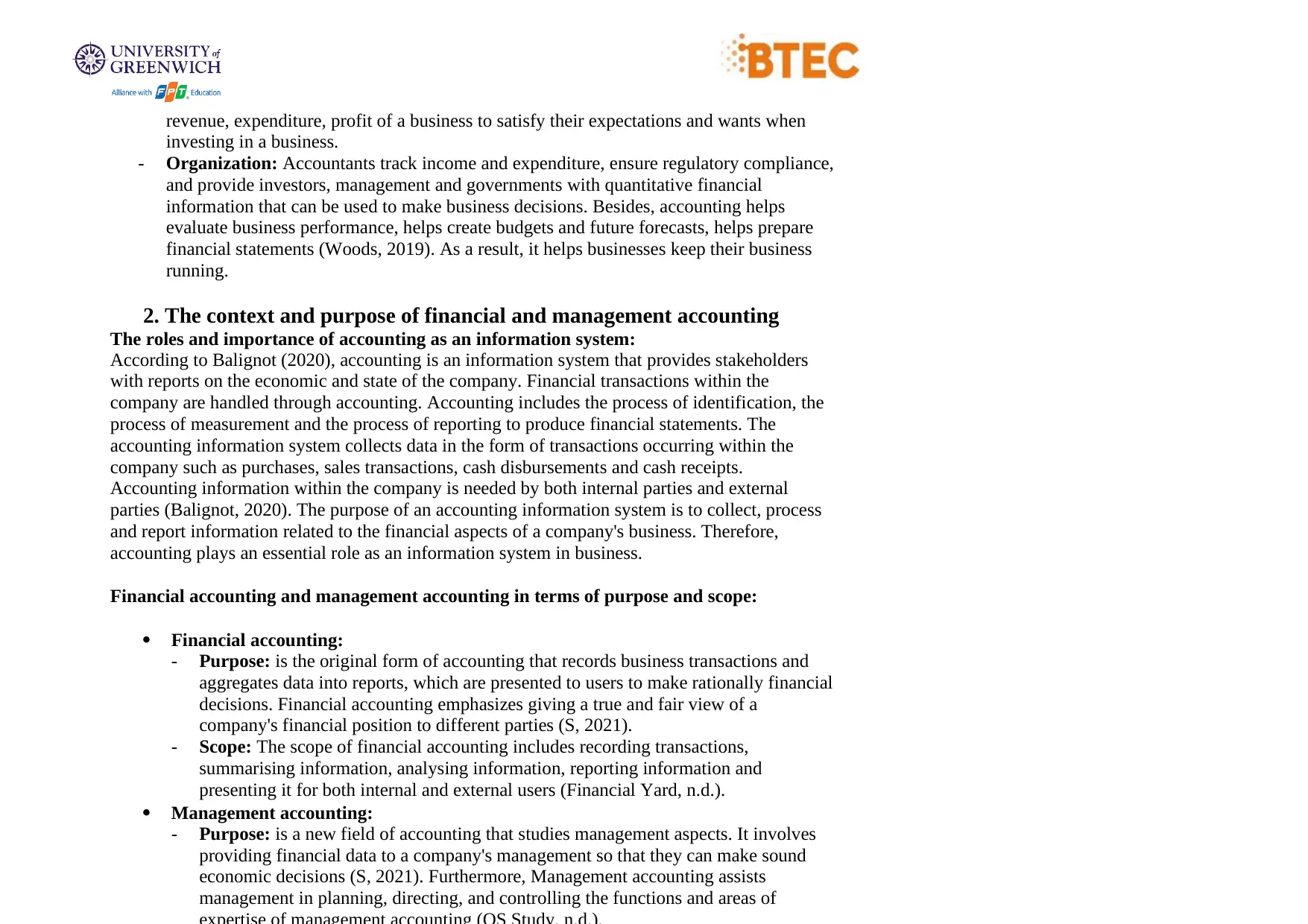
revenue, expenditure, profit of a business to satisfy their expectations and wants when
investing in a business.
- Organization: Accountants track income and expenditure, ensure regulatory compliance,
and provide investors, management and governments with quantitative financial
information that can be used to make business decisions. Besides, accounting helps
evaluate business performance, helps create budgets and future forecasts, helps prepare
financial statements (Woods, 2019). As a result, it helps businesses keep their business
running.
2. The context and purpose of financial and management accounting
The roles and importance of accounting as an information system:
According to Balignot (2020), accounting is an information system that provides stakeholders
with reports on the economic and state of the company. Financial transactions within the
company are handled through accounting. Accounting includes the process of identification, the
process of measurement and the process of reporting to produce financial statements. The
accounting information system collects data in the form of transactions occurring within the
company such as purchases, sales transactions, cash disbursements and cash receipts.
Accounting information within the company is needed by both internal parties and external
parties (Balignot, 2020). The purpose of an accounting information system is to collect, process
and report information related to the financial aspects of a company's business. Therefore,
accounting plays an essential role as an information system in business.
Financial accounting and management accounting in terms of purpose and scope:
Financial accounting:
- Purpose: is the original form of accounting that records business transactions and
aggregates data into reports, which are presented to users to make rationally financial
decisions. Financial accounting emphasizes giving a true and fair view of a
company's financial position to different parties (S, 2021).
- Scope: The scope of financial accounting includes recording transactions,
summarising information, analysing information, reporting information and
presenting it for both internal and external users (Financial Yard, n.d.).
Management accounting:
- Purpose: is a new field of accounting that studies management aspects. It involves
providing financial data to a company's management so that they can make sound
economic decisions (S, 2021). Furthermore, Management accounting assists
management in planning, directing, and controlling the functions and areas of
investing in a business.
- Organization: Accountants track income and expenditure, ensure regulatory compliance,
and provide investors, management and governments with quantitative financial
information that can be used to make business decisions. Besides, accounting helps
evaluate business performance, helps create budgets and future forecasts, helps prepare
financial statements (Woods, 2019). As a result, it helps businesses keep their business
running.
2. The context and purpose of financial and management accounting
The roles and importance of accounting as an information system:
According to Balignot (2020), accounting is an information system that provides stakeholders
with reports on the economic and state of the company. Financial transactions within the
company are handled through accounting. Accounting includes the process of identification, the
process of measurement and the process of reporting to produce financial statements. The
accounting information system collects data in the form of transactions occurring within the
company such as purchases, sales transactions, cash disbursements and cash receipts.
Accounting information within the company is needed by both internal parties and external
parties (Balignot, 2020). The purpose of an accounting information system is to collect, process
and report information related to the financial aspects of a company's business. Therefore,
accounting plays an essential role as an information system in business.
Financial accounting and management accounting in terms of purpose and scope:
Financial accounting:
- Purpose: is the original form of accounting that records business transactions and
aggregates data into reports, which are presented to users to make rationally financial
decisions. Financial accounting emphasizes giving a true and fair view of a
company's financial position to different parties (S, 2021).
- Scope: The scope of financial accounting includes recording transactions,
summarising information, analysing information, reporting information and
presenting it for both internal and external users (Financial Yard, n.d.).
Management accounting:
- Purpose: is a new field of accounting that studies management aspects. It involves
providing financial data to a company's management so that they can make sound
economic decisions (S, 2021). Furthermore, Management accounting assists
management in planning, directing, and controlling the functions and areas of
Secure Best Marks with AI Grader
Need help grading? Try our AI Grader for instant feedback on your assignments.
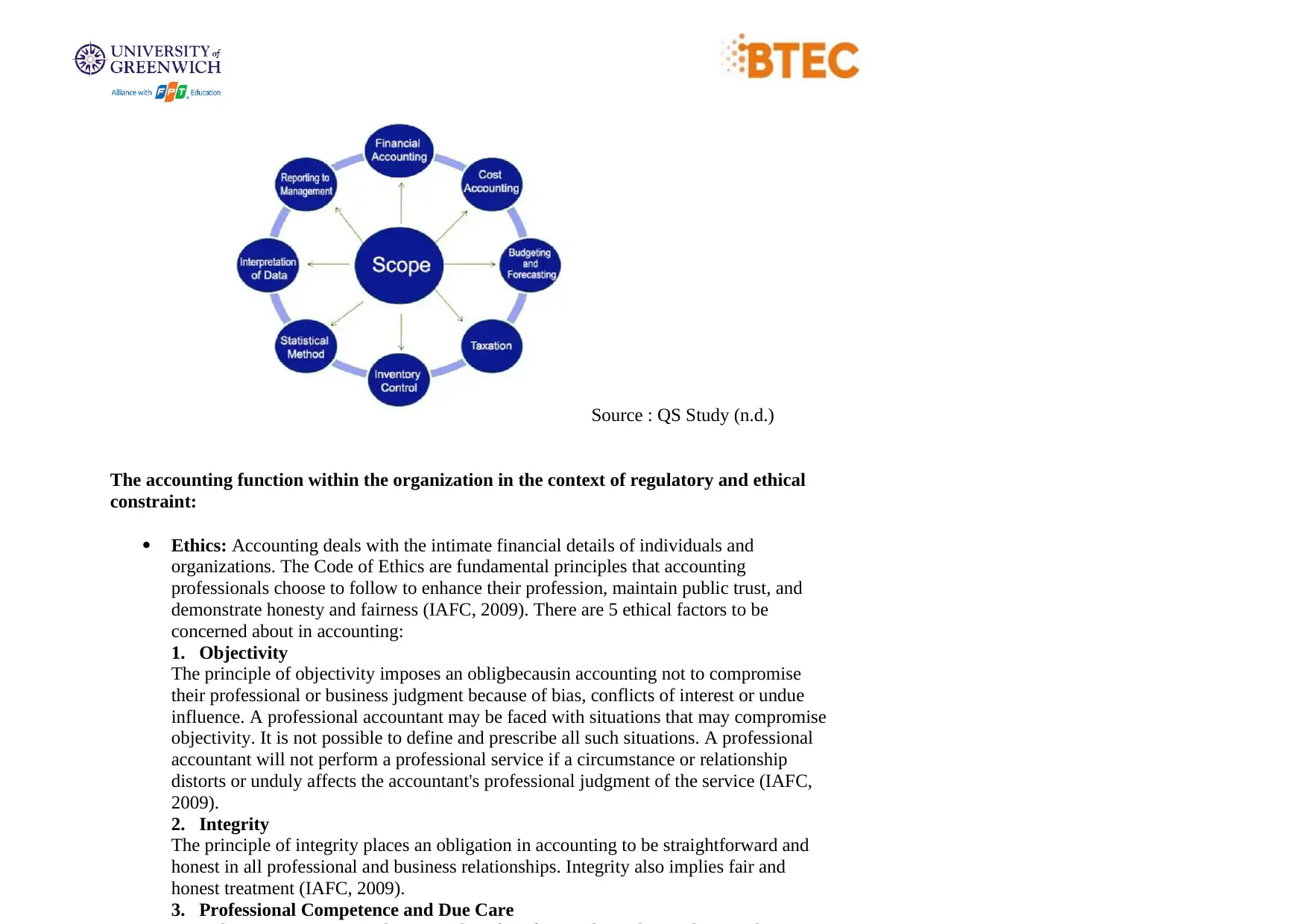
Source : QS Study (n.d.)
The accounting function within the organization in the context of regulatory and ethical
constraint:
Ethics: Accounting deals with the intimate financial details of individuals and
organizations. The Code of Ethics are fundamental principles that accounting
professionals choose to follow to enhance their profession, maintain public trust, and
demonstrate honesty and fairness (IAFC, 2009). There are 5 ethical factors to be
concerned about in accounting:
1. Objectivity
The principle of objectivity imposes an obligbecausin accounting not to compromise
their professional or business judgment because of bias, conflicts of interest or undue
influence. A professional accountant may be faced with situations that may compromise
objectivity. It is not possible to define and prescribe all such situations. A professional
accountant will not perform a professional service if a circumstance or relationship
distorts or unduly affects the accountant's professional judgment of the service (IAFC,
2009).
2. Integrity
The principle of integrity places an obligation in accounting to be straightforward and
honest in all professional and business relationships. Integrity also implies fair and
honest treatment (IAFC, 2009).
3. Professional Competence and Due Care
The accounting function within the organization in the context of regulatory and ethical
constraint:
Ethics: Accounting deals with the intimate financial details of individuals and
organizations. The Code of Ethics are fundamental principles that accounting
professionals choose to follow to enhance their profession, maintain public trust, and
demonstrate honesty and fairness (IAFC, 2009). There are 5 ethical factors to be
concerned about in accounting:
1. Objectivity
The principle of objectivity imposes an obligbecausin accounting not to compromise
their professional or business judgment because of bias, conflicts of interest or undue
influence. A professional accountant may be faced with situations that may compromise
objectivity. It is not possible to define and prescribe all such situations. A professional
accountant will not perform a professional service if a circumstance or relationship
distorts or unduly affects the accountant's professional judgment of the service (IAFC,
2009).
2. Integrity
The principle of integrity places an obligation in accounting to be straightforward and
honest in all professional and business relationships. Integrity also implies fair and
honest treatment (IAFC, 2009).
3. Professional Competence and Due Care

According to IAFC (2009), the Confidentiality Principle imposes an obligation in
accounting to refrain from:
(a) Disclosure to outside company or organization using confidential information
obtained as a result of professional and business relationships without appropriate and
specific authority or unless authorized or legal or professional obligation to disclose.
(b) Use confidential information obtained from professional and business relationships
for their own personal benefit or the benefit of third parties.
A professional accountant must maintain confidentiality, even in a social setting, alert to
the possibility of accidental disclosure, especially to a close business associate or a close
member or directly in the family. A professional accountant must also maintain the
confidentiality of information disclosed by a potential client or employer (IAFC, 2009).
5. Professional Behavior
The principle of professional behavior places an obligation in accounting to comply with
relevant laws and regulations and to avoid any action known or ought to be known by
professional accountants that could discredit the profession. This includes actions that a
reasonable and informed third party, taking into account all specific facts and
circumstances available to the professional accountant at that time, might conclude to
affect negatively for the reputation of the profession (IAFC, 2009).
Principles:
1. Cost
According to ACCOUNTINGTOOLS (2021), this is the concept that business should
only recognize assets, liabilities, and investments in equity at the original purchase price.
This principle is becoming less and less effective as a range of accounting standards are
geared towards adjusting assets and liabilities to their fair values.
2. Matching
The matching principle aims to adjust revenues and costs. Expenses must be recognized
in the period in which revenue is earned from them. In the same way, revenue must be
recognized in the period in which the costs incurred to earn them are recognised. The
matching principle is actually the result of applying the concept of accumulation
(ACCOUNTINGVERSE, n.d.).
3. Revenue Recognition
Revenue should be recognized on a company's income statement when it is earned. As a
result, a company will report some revenue on its income statement before customers
pay for goods or services they have received. In the case of cash sales, revenue will be
reported when the customer pays for their merchandise. If the customer pays in advance,
the revenue will be reported after receipt of the money (ACCOUNTINGCOACH, n.d.).
4. Full Disclosure
accounting to refrain from:
(a) Disclosure to outside company or organization using confidential information
obtained as a result of professional and business relationships without appropriate and
specific authority or unless authorized or legal or professional obligation to disclose.
(b) Use confidential information obtained from professional and business relationships
for their own personal benefit or the benefit of third parties.
A professional accountant must maintain confidentiality, even in a social setting, alert to
the possibility of accidental disclosure, especially to a close business associate or a close
member or directly in the family. A professional accountant must also maintain the
confidentiality of information disclosed by a potential client or employer (IAFC, 2009).
5. Professional Behavior
The principle of professional behavior places an obligation in accounting to comply with
relevant laws and regulations and to avoid any action known or ought to be known by
professional accountants that could discredit the profession. This includes actions that a
reasonable and informed third party, taking into account all specific facts and
circumstances available to the professional accountant at that time, might conclude to
affect negatively for the reputation of the profession (IAFC, 2009).
Principles:
1. Cost
According to ACCOUNTINGTOOLS (2021), this is the concept that business should
only recognize assets, liabilities, and investments in equity at the original purchase price.
This principle is becoming less and less effective as a range of accounting standards are
geared towards adjusting assets and liabilities to their fair values.
2. Matching
The matching principle aims to adjust revenues and costs. Expenses must be recognized
in the period in which revenue is earned from them. In the same way, revenue must be
recognized in the period in which the costs incurred to earn them are recognised. The
matching principle is actually the result of applying the concept of accumulation
(ACCOUNTINGVERSE, n.d.).
3. Revenue Recognition
Revenue should be recognized on a company's income statement when it is earned. As a
result, a company will report some revenue on its income statement before customers
pay for goods or services they have received. In the case of cash sales, revenue will be
reported when the customer pays for their merchandise. If the customer pays in advance,
the revenue will be reported after receipt of the money (ACCOUNTINGCOACH, n.d.).
4. Full Disclosure
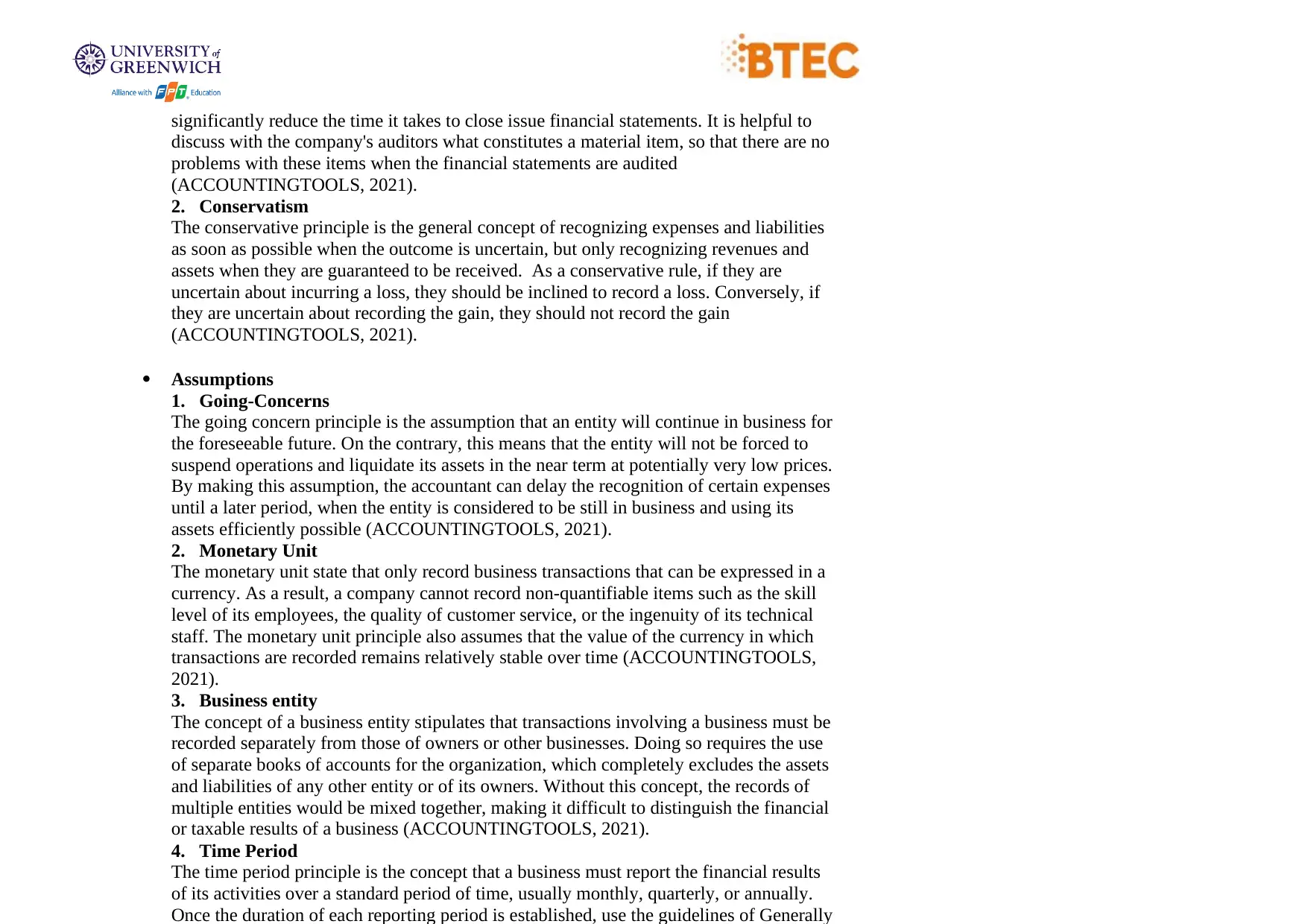
significantly reduce the time it takes to close issue financial statements. It is helpful to
discuss with the company's auditors what constitutes a material item, so that there are no
problems with these items when the financial statements are audited
(ACCOUNTINGTOOLS, 2021).
2. Conservatism
The conservative principle is the general concept of recognizing expenses and liabilities
as soon as possible when the outcome is uncertain, but only recognizing revenues and
assets when they are guaranteed to be received. As a conservative rule, if they are
uncertain about incurring a loss, they should be inclined to record a loss. Conversely, if
they are uncertain about recording the gain, they should not record the gain
(ACCOUNTINGTOOLS, 2021).
Assumptions
1. Going-Concerns
The going concern principle is the assumption that an entity will continue in business for
the foreseeable future. On the contrary, this means that the entity will not be forced to
suspend operations and liquidate its assets in the near term at potentially very low prices.
By making this assumption, the accountant can delay the recognition of certain expenses
until a later period, when the entity is considered to be still in business and using its
assets efficiently possible (ACCOUNTINGTOOLS, 2021).
2. Monetary Unit
The monetary unit state that only record business transactions that can be expressed in a
currency. As a result, a company cannot record non-quantifiable items such as the skill
level of its employees, the quality of customer service, or the ingenuity of its technical
staff. The monetary unit principle also assumes that the value of the currency in which
transactions are recorded remains relatively stable over time (ACCOUNTINGTOOLS,
2021).
3. Business entity
The concept of a business entity stipulates that transactions involving a business must be
recorded separately from those of owners or other businesses. Doing so requires the use
of separate books of accounts for the organization, which completely excludes the assets
and liabilities of any other entity or of its owners. Without this concept, the records of
multiple entities would be mixed together, making it difficult to distinguish the financial
or taxable results of a business (ACCOUNTINGTOOLS, 2021).
4. Time Period
The time period principle is the concept that a business must report the financial results
of its activities over a standard period of time, usually monthly, quarterly, or annually.
Once the duration of each reporting period is established, use the guidelines of Generally
discuss with the company's auditors what constitutes a material item, so that there are no
problems with these items when the financial statements are audited
(ACCOUNTINGTOOLS, 2021).
2. Conservatism
The conservative principle is the general concept of recognizing expenses and liabilities
as soon as possible when the outcome is uncertain, but only recognizing revenues and
assets when they are guaranteed to be received. As a conservative rule, if they are
uncertain about incurring a loss, they should be inclined to record a loss. Conversely, if
they are uncertain about recording the gain, they should not record the gain
(ACCOUNTINGTOOLS, 2021).
Assumptions
1. Going-Concerns
The going concern principle is the assumption that an entity will continue in business for
the foreseeable future. On the contrary, this means that the entity will not be forced to
suspend operations and liquidate its assets in the near term at potentially very low prices.
By making this assumption, the accountant can delay the recognition of certain expenses
until a later period, when the entity is considered to be still in business and using its
assets efficiently possible (ACCOUNTINGTOOLS, 2021).
2. Monetary Unit
The monetary unit state that only record business transactions that can be expressed in a
currency. As a result, a company cannot record non-quantifiable items such as the skill
level of its employees, the quality of customer service, or the ingenuity of its technical
staff. The monetary unit principle also assumes that the value of the currency in which
transactions are recorded remains relatively stable over time (ACCOUNTINGTOOLS,
2021).
3. Business entity
The concept of a business entity stipulates that transactions involving a business must be
recorded separately from those of owners or other businesses. Doing so requires the use
of separate books of accounts for the organization, which completely excludes the assets
and liabilities of any other entity or of its owners. Without this concept, the records of
multiple entities would be mixed together, making it difficult to distinguish the financial
or taxable results of a business (ACCOUNTINGTOOLS, 2021).
4. Time Period
The time period principle is the concept that a business must report the financial results
of its activities over a standard period of time, usually monthly, quarterly, or annually.
Once the duration of each reporting period is established, use the guidelines of Generally
Paraphrase This Document
Need a fresh take? Get an instant paraphrase of this document with our AI Paraphraser
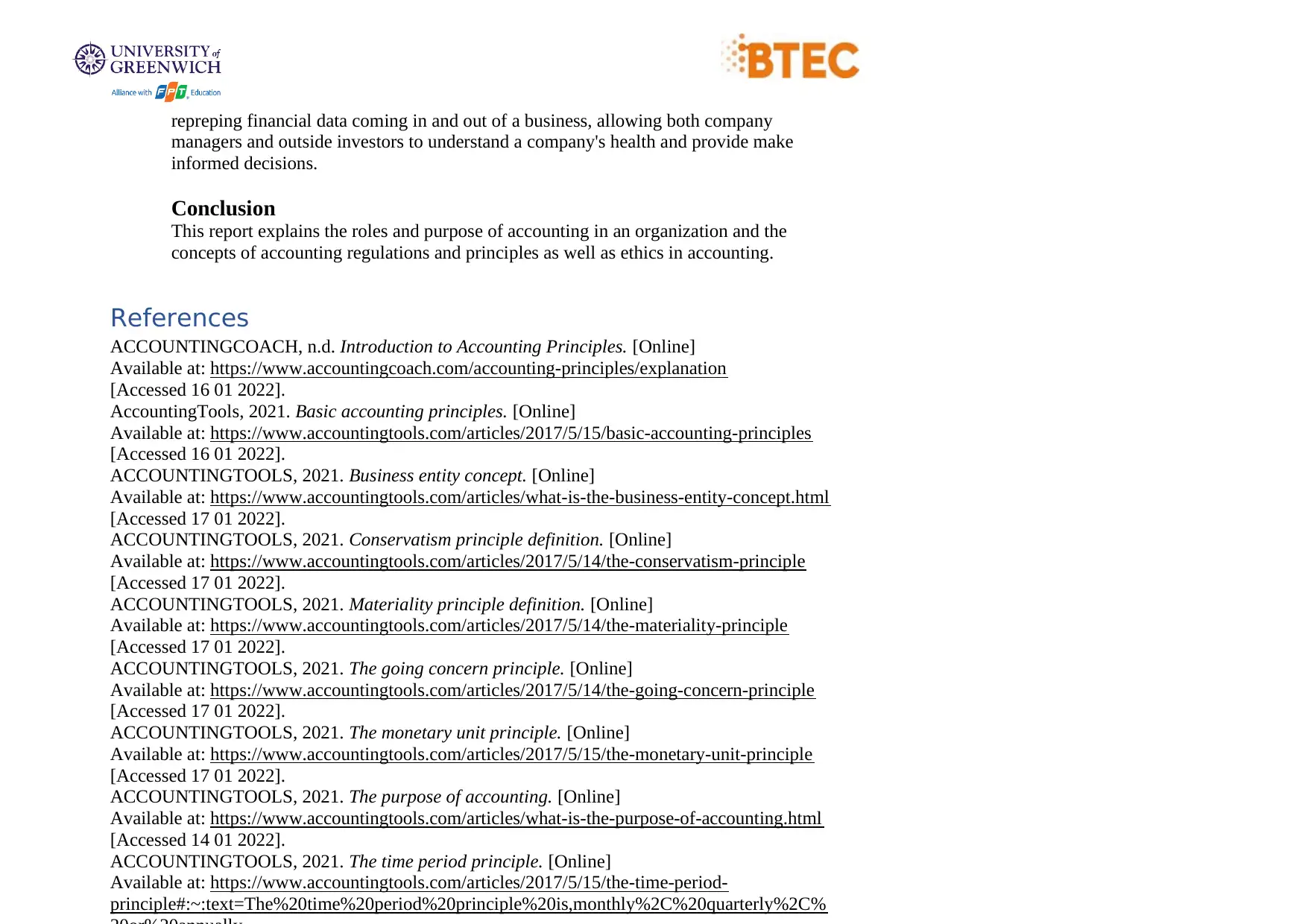
repreping financial data coming in and out of a business, allowing both company
managers and outside investors to understand a company's health and provide make
informed decisions.
Conclusion
This report explains the roles and purpose of accounting in an organization and the
concepts of accounting regulations and principles as well as ethics in accounting.
References
ACCOUNTINGCOACH, n.d. Introduction to Accounting Principles. [Online]
Available at: https://www.accountingcoach.com/accounting-principles/explanation
[Accessed 16 01 2022].
AccountingTools, 2021. Basic accounting principles. [Online]
Available at: https://www.accountingtools.com/articles/2017/5/15/basic-accounting-principles
[Accessed 16 01 2022].
ACCOUNTINGTOOLS, 2021. Business entity concept. [Online]
Available at: https://www.accountingtools.com/articles/what-is-the-business-entity-concept.html
[Accessed 17 01 2022].
ACCOUNTINGTOOLS, 2021. Conservatism principle definition. [Online]
Available at: https://www.accountingtools.com/articles/2017/5/14/the-conservatism-principle
[Accessed 17 01 2022].
ACCOUNTINGTOOLS, 2021. Materiality principle definition. [Online]
Available at: https://www.accountingtools.com/articles/2017/5/14/the-materiality-principle
[Accessed 17 01 2022].
ACCOUNTINGTOOLS, 2021. The going concern principle. [Online]
Available at: https://www.accountingtools.com/articles/2017/5/14/the-going-concern-principle
[Accessed 17 01 2022].
ACCOUNTINGTOOLS, 2021. The monetary unit principle. [Online]
Available at: https://www.accountingtools.com/articles/2017/5/15/the-monetary-unit-principle
[Accessed 17 01 2022].
ACCOUNTINGTOOLS, 2021. The purpose of accounting. [Online]
Available at: https://www.accountingtools.com/articles/what-is-the-purpose-of-accounting.html
[Accessed 14 01 2022].
ACCOUNTINGTOOLS, 2021. The time period principle. [Online]
Available at: https://www.accountingtools.com/articles/2017/5/15/the-time-period-
principle#:~:text=The%20time%20period%20principle%20is,monthly%2C%20quarterly%2C%
managers and outside investors to understand a company's health and provide make
informed decisions.
Conclusion
This report explains the roles and purpose of accounting in an organization and the
concepts of accounting regulations and principles as well as ethics in accounting.
References
ACCOUNTINGCOACH, n.d. Introduction to Accounting Principles. [Online]
Available at: https://www.accountingcoach.com/accounting-principles/explanation
[Accessed 16 01 2022].
AccountingTools, 2021. Basic accounting principles. [Online]
Available at: https://www.accountingtools.com/articles/2017/5/15/basic-accounting-principles
[Accessed 16 01 2022].
ACCOUNTINGTOOLS, 2021. Business entity concept. [Online]
Available at: https://www.accountingtools.com/articles/what-is-the-business-entity-concept.html
[Accessed 17 01 2022].
ACCOUNTINGTOOLS, 2021. Conservatism principle definition. [Online]
Available at: https://www.accountingtools.com/articles/2017/5/14/the-conservatism-principle
[Accessed 17 01 2022].
ACCOUNTINGTOOLS, 2021. Materiality principle definition. [Online]
Available at: https://www.accountingtools.com/articles/2017/5/14/the-materiality-principle
[Accessed 17 01 2022].
ACCOUNTINGTOOLS, 2021. The going concern principle. [Online]
Available at: https://www.accountingtools.com/articles/2017/5/14/the-going-concern-principle
[Accessed 17 01 2022].
ACCOUNTINGTOOLS, 2021. The monetary unit principle. [Online]
Available at: https://www.accountingtools.com/articles/2017/5/15/the-monetary-unit-principle
[Accessed 17 01 2022].
ACCOUNTINGTOOLS, 2021. The purpose of accounting. [Online]
Available at: https://www.accountingtools.com/articles/what-is-the-purpose-of-accounting.html
[Accessed 14 01 2022].
ACCOUNTINGTOOLS, 2021. The time period principle. [Online]
Available at: https://www.accountingtools.com/articles/2017/5/15/the-time-period-
principle#:~:text=The%20time%20period%20principle%20is,monthly%2C%20quarterly%2C%

Financial Yard, n.d. The Scope Of Financial Accounting. [Online]
Available at: https://financialyard.com/scope-of-financial-accounting/
[Accessed 15 01 2022].
IAFC, 2009. Code of Ethics for Professional. [Online]
Available at: https://www.ifac.org/system/files/publications/files/Code-of-
Ethics_July_2009_FINAL_02_23_10.pdf
[Accessed 16 01 2022].
Indeed Editorial Team, 2021. What Are the Functions of Accounting?. [Online]
Available at: https://www.indeed.com/career-advice/career-development/functions-of-
accounting
[Accessed 14 01 2022].
INVESTOPEDIA, n.d. Accounting. [Online]
Available at: https://www.investopedia.com/terms/a/accounting.asp
[Accessed 14 01 2021].
Javed, R., 2021. Users of accounting information. [Online]
Available at: https://www.accountingformanagement.org/users-of-accounting-information/
[Accessed 14 01 2022].
Kotler, 2012. Principles of Marketing, 14th edition. New York: Prentice Hall.
Kotler, P., Armstrong, G., Wong, V. & Saunders, J., 2008. Principles of Marketing - Fifth
European Edition. Essex: Prentice Hall.
QS Study, n.d. Scope of Management Accounting. [Online]
Available at: https://qsstudy.com/scope-field-management-accounting/
[Accessed 15 01 2022].
S, S., 2021. Difference Between Financial Accounting and Management Accounting. [Online]
Available at: https://keydifferences.com/difference-between-financial-accounting-and-
management-accounting.html
[Accessed 15 01 2022].
Woods, D., 2019. The Role of Accounting in Business and Why It’s Important. [Online]
Available at: https://www.pdr-cpa.com/knowledge-center/blog/role-of-accounting-in-
business#:~:text=Accounting%20plays%20a%20vital%20role,used%20in%20making%20busine
ss%20decisions.
[Accessed 17 01 2022].
Available at: https://financialyard.com/scope-of-financial-accounting/
[Accessed 15 01 2022].
IAFC, 2009. Code of Ethics for Professional. [Online]
Available at: https://www.ifac.org/system/files/publications/files/Code-of-
Ethics_July_2009_FINAL_02_23_10.pdf
[Accessed 16 01 2022].
Indeed Editorial Team, 2021. What Are the Functions of Accounting?. [Online]
Available at: https://www.indeed.com/career-advice/career-development/functions-of-
accounting
[Accessed 14 01 2022].
INVESTOPEDIA, n.d. Accounting. [Online]
Available at: https://www.investopedia.com/terms/a/accounting.asp
[Accessed 14 01 2021].
Javed, R., 2021. Users of accounting information. [Online]
Available at: https://www.accountingformanagement.org/users-of-accounting-information/
[Accessed 14 01 2022].
Kotler, 2012. Principles of Marketing, 14th edition. New York: Prentice Hall.
Kotler, P., Armstrong, G., Wong, V. & Saunders, J., 2008. Principles of Marketing - Fifth
European Edition. Essex: Prentice Hall.
QS Study, n.d. Scope of Management Accounting. [Online]
Available at: https://qsstudy.com/scope-field-management-accounting/
[Accessed 15 01 2022].
S, S., 2021. Difference Between Financial Accounting and Management Accounting. [Online]
Available at: https://keydifferences.com/difference-between-financial-accounting-and-
management-accounting.html
[Accessed 15 01 2022].
Woods, D., 2019. The Role of Accounting in Business and Why It’s Important. [Online]
Available at: https://www.pdr-cpa.com/knowledge-center/blog/role-of-accounting-in-
business#:~:text=Accounting%20plays%20a%20vital%20role,used%20in%20making%20busine
ss%20decisions.
[Accessed 17 01 2022].
1 out of 9
Related Documents
Your All-in-One AI-Powered Toolkit for Academic Success.
+13062052269
info@desklib.com
Available 24*7 on WhatsApp / Email
![[object Object]](/_next/static/media/star-bottom.7253800d.svg)
Unlock your academic potential
© 2024 | Zucol Services PVT LTD | All rights reserved.





